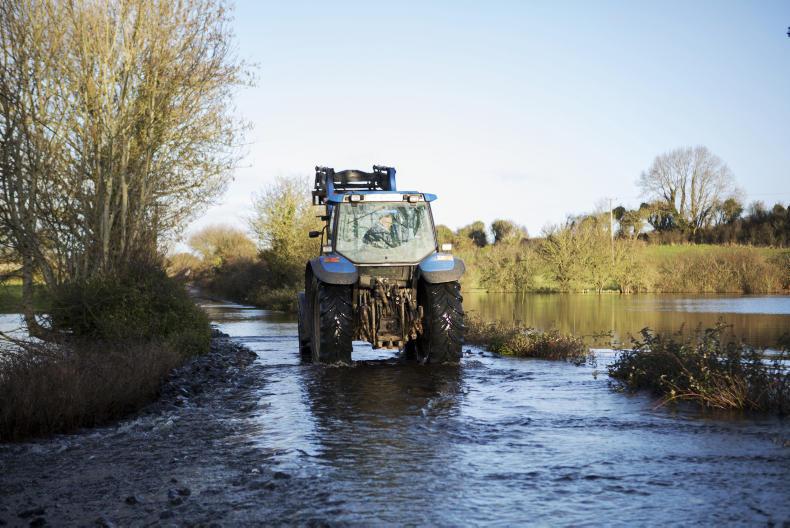“Climate change will require adaptation to a new reality and this will affect farmers more directly than most other sectors of society,” the EPA said in its new assessment of Ireland’s environment. The agency noted that the mean annual air temperature had already increased by 0.8°C in the past 110 years and average annual rainfall by 60mm in the period from 1981 to 2010 compared with 1961 to 1990.
There sill be higher risk of disruption of agricultural activities if adaptation measures such as water management systems are not adopted
Although modelling the future of Ireland’s climate is uncertain because of its location where Europe meets the Atlantic Ocean, the EPA predicts that “precipitation may occur in more intense downpours together with longer dry spells, impacting on run-off volumes and water availability between rainfall events”. Referencing last year’s flooding and the 2012-2013 fodder crisis, the agency said: “There will be higher risk of disruption of agricultural activities if adaptation measures such as water management systems are not adopted.”
The decreasing number of frost days also poses the risk of emergent animal and plant diseases establishing in Ireland, according to the EPA.
Greenhouse gas emissions
In addition to dealing with its effects, farmers are also expected to tackle the causes of climate change. While international targets impose a reduction in greenhouse gas emissions, the latest EPA projections show a 6% increase in emissions from agriculture between 2014 and 2020. This “may place a burden on the wider economy” if penalties are imposed on Ireland for missing its targets.
While methane from livestock’s rumen has focused most of the attention, the EPA highlights the challenge posed by the ammonia emitted during slurry and fertiliser spreading. “Given that ammonia emissions are largely determined by cattle numbers, projected increases in the national herd present a real challenge,” the agency warns.
Read more
Flooded farmers could be paid to relocate farmyards
Full coverage: flooding
Full coverage: agriculture and climate change
“Climate change will require adaptation to a new reality and this will affect farmers more directly than most other sectors of society,” the EPA said in its new assessment of Ireland’s environment. The agency noted that the mean annual air temperature had already increased by 0.8°C in the past 110 years and average annual rainfall by 60mm in the period from 1981 to 2010 compared with 1961 to 1990.
There sill be higher risk of disruption of agricultural activities if adaptation measures such as water management systems are not adopted
Although modelling the future of Ireland’s climate is uncertain because of its location where Europe meets the Atlantic Ocean, the EPA predicts that “precipitation may occur in more intense downpours together with longer dry spells, impacting on run-off volumes and water availability between rainfall events”. Referencing last year’s flooding and the 2012-2013 fodder crisis, the agency said: “There will be higher risk of disruption of agricultural activities if adaptation measures such as water management systems are not adopted.”
The decreasing number of frost days also poses the risk of emergent animal and plant diseases establishing in Ireland, according to the EPA.
Greenhouse gas emissions
In addition to dealing with its effects, farmers are also expected to tackle the causes of climate change. While international targets impose a reduction in greenhouse gas emissions, the latest EPA projections show a 6% increase in emissions from agriculture between 2014 and 2020. This “may place a burden on the wider economy” if penalties are imposed on Ireland for missing its targets.
While methane from livestock’s rumen has focused most of the attention, the EPA highlights the challenge posed by the ammonia emitted during slurry and fertiliser spreading. “Given that ammonia emissions are largely determined by cattle numbers, projected increases in the national herd present a real challenge,” the agency warns.
Read more
Flooded farmers could be paid to relocate farmyards
Full coverage: flooding
Full coverage: agriculture and climate change






 This is a subscriber-only article
This is a subscriber-only article










SHARING OPTIONS: